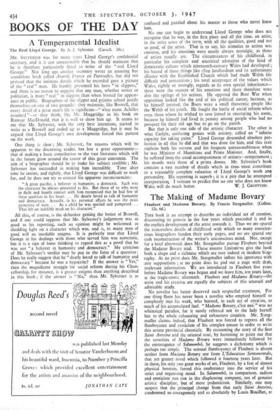BOOKS OF THE DAY
A Temperamental Idealist
The Real Lloyd George. By A. J. Sylvester. (Cassell. 18s.) MR. SYLVESTER was for many years Lloyd George's confidential secretary, and it is not unreasonable that he should maintain that he is therefore particularly fitted to write of the "real Lloyd George." Not long ago another secretary wrote an amusing but scandalous book called Anatole France en Pantoufies, but did not pretend that the intimate details which he recorded gave a picture of the " real " man. He frankly presented his hero " in slippers," and there is no reason to suppose that any man, whether writer or politician, is more " real " in slippers than when booted for appear- ance in public. Biographers of the slipper and pyjama school justify themselves on one of two grounds: they maintain, like Boswell, that every detail of a great man's life is significant—" what name Achilles assumed "—or they think, Re Mr. Muggridge in his book on Ramsay MacDonald, that it is well to show him up. It seems to me that Mr. Sylvester, with the very best intentions, started to write as a Boswell and ended up as a Muggridge, but it may be argued that Lloyd George's own development forced this pattern on the work.
One thing is clear ; Mr. Sylvester, for reasons which will be apparent to the discerning reader, has lost a great opportunity— that of making a basic contribution to the vast literature which will in the future grow around the career of this great statesman. The aim of a biographer should be to make his subject credible ; Mr. Sylvester has succeeded in making him incredible. Time after time he insists, and rightly, that Lloyd George was difficult to work for, and he does not try to conceal his apparent inconsistencies: "A great pacifist, a believer in humanity, a democrat. Such was the character he always presented as his. But those of us who were in daily and hourly contact with him recognised that he had few of these qualities in his heart. . . He dearly loved to talk of humanity and democracy. Actually, in his personal affairs he was the most autocratic of men. . . As a child he was spoiled and pampered.. . That left an indelible mark on his character."
All this, of course, is the debunker getting the better of Boswell, and if one could suppose that Mr. Sylvester's judgement was as good as his reporting, such an opinion might be welcomed as shedding light on a character which was, and is, to many men of good will an insoluble enigma. It is perfectly true that Lloyd George in his dealings with those who served him was autocratic, but it is a sign of loose thinking to regard this as a proof that he was not " a believer in humanity and democracy." My criticism- of Mr. Sylvester's verdict may be put in the form of a question: Does he really suggest that he "dearly loved to talk of humanity and democracy " because he was a hypocrite? If the answer is " Yes," then the magnificent struggle for social reform during his Chan- cellorship, for instance, is a greater enigma than anything described in this book ; if the answer is " No," then Mr. Sylvester is as confused and puzzled about his master as those who never knew him.
No one can begin to understand Lloyd George who does not recognise that he was, in the first place and all the time, an artist,
in the strict sense of the term, with all the qualities, good and not
so good, of the artist. That is to say, his stimulus to action was emotion, and his emotions were nearly always nostalgic, as those
of artists usually are. The circumstances of his childhood, in particular his complete and uncritical adoration of the kind of democratic culture which nineteenth-century Wales had developed ; his hatred of those things like Hien landlordism and its unfortunate alliance with the Established Church which had made Welsh life difficult and contentious ; his total acceptance of the values which Wales, rightly or wrongly, regards as its own special inheritance— these were the sources of his emotions and these therefore were also the springs of his actions. He opposed the Boer War when opposition looked like the end of his political career, because, as he himself insisted, the Boers were a small theocratic people like the Welsh of his youth. He fought the battle of social reform when even those whom he wished to save joined in execrating his name, because he himself had lived in penury among people who had no prospect for their old age but to go on the parish.
But that is only one side of the artistic character. The other is what Carlyle, confusing genius with artistry, called an " infinite capacity for taking pains." Lloyd George demanded absolute per- fection in all that he did and that was done for him, and this trait explains both his success and his frequent unreasonableness when he was Minister of Munitions and Prime Minister. And, finally, he suffered from the usual accompaniment of artistry—temperament ; his moods were those of a prima donna. Mr. Sylvester's book contains a vast number of details which in time must contribute to a reasonably complete valuation of Lloyd George's work arts personality. His reporting is superb ; it is a pity that he attempted interpretatical I venture to predict that no one who does not know


































 Previous page
Previous page